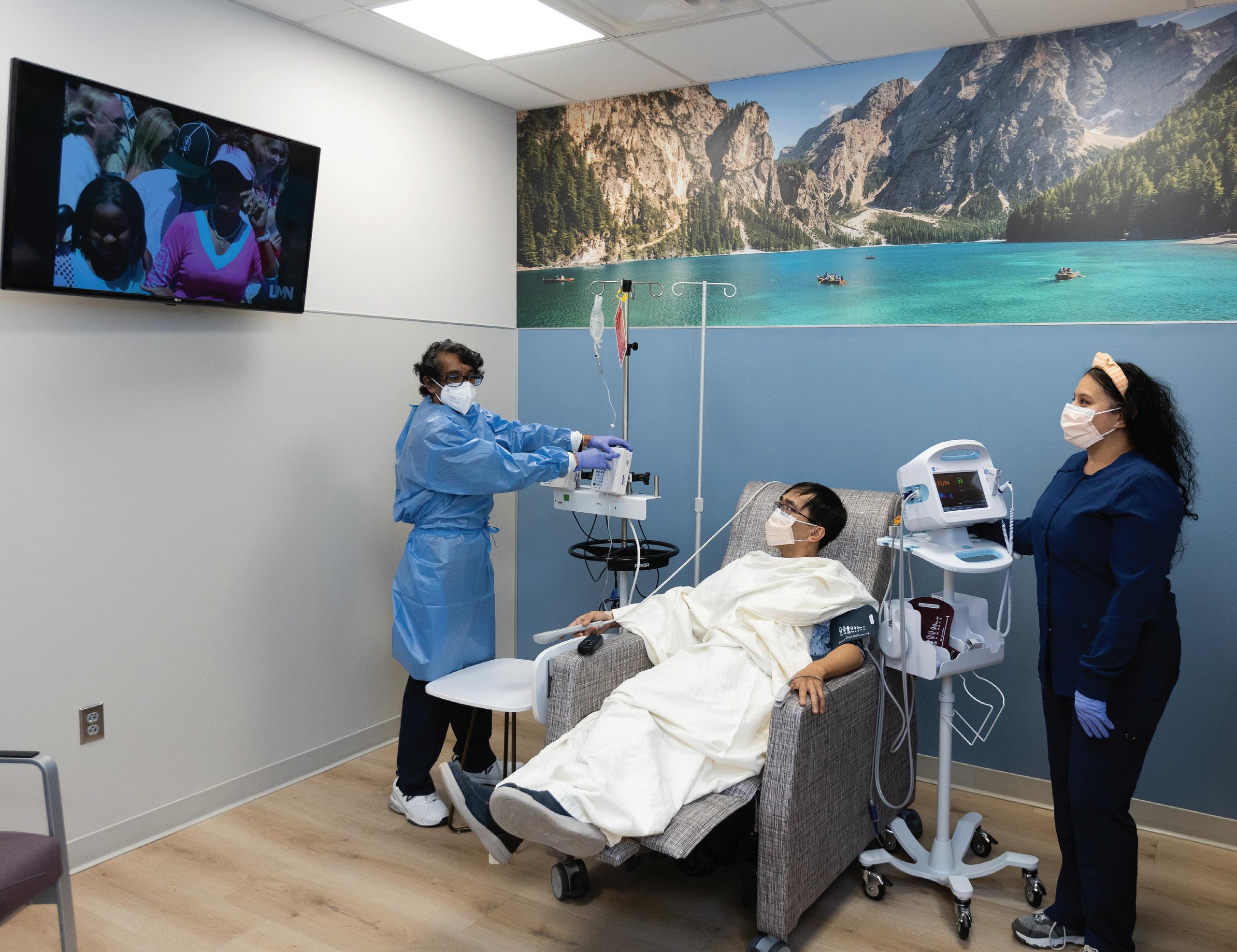
4 minute read
HOW TO BUILD A HEALTHCARE TEAM.
IT ALL STARTS WITH YOUR PRIMARY CARE PROVIDER.
People get things done by working with teams—in sports, in accomplishing goals at work and more.
In many ways, though, the most important team in a person’s life is their healthcare team—all the doctors, nurses, lab technicians and other professionals who play a part in keeping a patient healthy.
Your primary care provider (PCP), who may be a family physician or an internal medicine specialist, is the person who helps to coordinate the team and helps you choose some of the people on it. NEHA PATEL, MD “While doctors and nurses may be the most visible members of a healthcare team, there are many more members, all of whom are important for helping to keep you at your healthiest,” explains Neha Patel, MD, a family medicine specialist affiliated with Jersey City Medical Center and a member of RWJBarnabas Health Medical Group.
MANY WAYS
TO CARE
Your healthcare team members will include:
PRIMARY CARE
PROVIDER. You should see your PCP each year for your annual physical. During this visit, the PCP will discuss preventive care, treatment of common illnesses, early detection of diseases and management of chronic conditions. In most cases, he or she can recommend appropriate testing as well as provide a diagnosis, advice and a treatment plan.
MEDICAL SPECIALISTS.
“If a patient has a condition that a primary care physician does not have the expertise for, we will refer the patient to another specialty,” says Dr. Patel. Common referrals include cardiologists, orthopedists, pulmonologists, neurologists, surgeons and obstetricians.
It’s helpful if your team’s doctors are all connected with the same health system. “Being cared for by practitioners within the same system allows for continuity of care,”

explains Dr. Patel. “For instance, many of the physicians affiliated with RWJBarnabas Health share an electronic health records system. This means that if I send a patient to a cardiologist, in some cases I can check online and see what happened—all the care information is in there.”
Patients sometimes weigh in on a PCP’s specialist recommendation. “A patient might tell me, ‘I went to see the cardiologist you recommended. He’s great. I like how he treated me,’” says. Dr. Patel. “Then I’ll suggest the next patient go to that doctor because I heard good things about them.”
Ultimately, however, the patient is the one who makes the decision about which specialist to choose. “It’s really important for the patient to be part of the treatment plan and to be comfortable with all their healthcare providers,” says Dr. Patel.
CERTIFIED MEDICAL
ASSISTANTS. On an office visit, you’ll generally see someone from the practice’s medical staff before you meet with the physician or nurse practitioner. “Everyone in the medical office is part of the team,” says Dr. Patel. “These are the people who bring you into the examining room, weigh you and take your blood pressure. They’re available if you need anything.”
Certified medical assistants help keep medical records by recording patients’ histories, medicines and treatments. They provide patient education and perform some diagnostic tests. Afterward, they’ll be available to address many of your questions and concerns.
MENTAL AND BEHAVIORAL HEALTH
EXPERTS. “I’m a family physician, so sometimes the whole family comes to see me and I get to see the family situation,” says Dr. Patel.
“That means I am able to understand and assess the entire family’s health status. Patients’ emotional well-being is as important as their physical health.”
Your PCP may refer you to a psychologist, counselor or behavioral health specialist to help with emotional issues or with behaviors that are preventing you from maintaining healthy habits. TECHNICIANS. Members of the team include phlebotomists (who draw blood for your lab tests), radiologists and technicians who take your X-rays or do your MRI.
PHARMACISTS. They not only fill prescriptions but also keep an eye out for harmful drug interactions and can answer patients’ questions about their medications.
PHYSICAL THERAPISTS
AND REHABILITATION
SPECIALISTS. These providers help get people back into action after an injury, major surgery or illness.
NUTRITIONISTS AND
DIETITIANS. These specialists will be your go-to for learning to eat well and manage chronic conditions, such as hypertension and diabetes.
There may be times when your health team expands to include care providers outside of the “regular” medical system. Sometimes patients decide to try alternative therapies and may consult an herbalist, an acupuncturist or others.
“It’s very important to let your primary care doctor and other members of your medical team know about these alternative treatments,” says Dr. Patel. “Things like herbal supplements, for example, can sometimes have side effects or interact badly with other medications.”
Always make sure that your PCP— the captain of your health team—is in the loop about any care you’re receiving outside of your main medical team, so that you can be sure you’re consistently getting the best treatment.
To find an RWJBarnabas Medical Group primary care provider affiliated with Jersey City Medical Center, call 888.724.7123 or visit www.rwjbh.org/medgroupprimarycare.
355 Grand St., Jersey City, NJ 07302
You don’t feel a lump, swelling or tenderness. You still need a mammogram.
At Jersey City Medical Center, together with Rutgers Cancer
NCI Institute of New Jersey, the state’s only National Cancer Institute-designated Comprehensive Cancer Center, Designated Comprehensive we offer the latest in comprehensive breast health
Cancer Center services including mammograms, 3D mammograms, breast MRI, genetic testing, breast surgery and more — like peace of mind. And with breast health centers conveniently located throughout New Jersey, finding us is simple, too. Schedule your mammogram at rwjbh.org/HudsonCounty

NON PROFIT U.S. POSTAGE PAID Harrisburg, PA Permit #324










